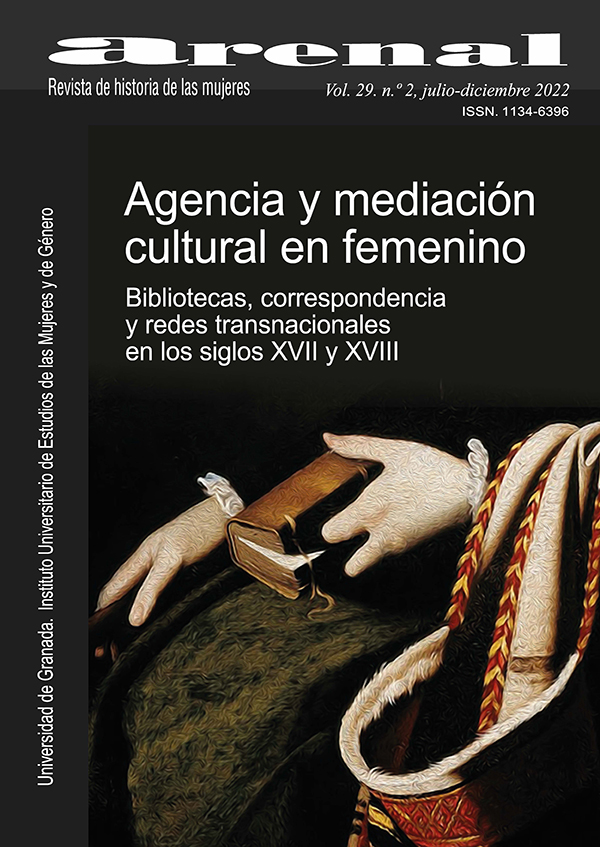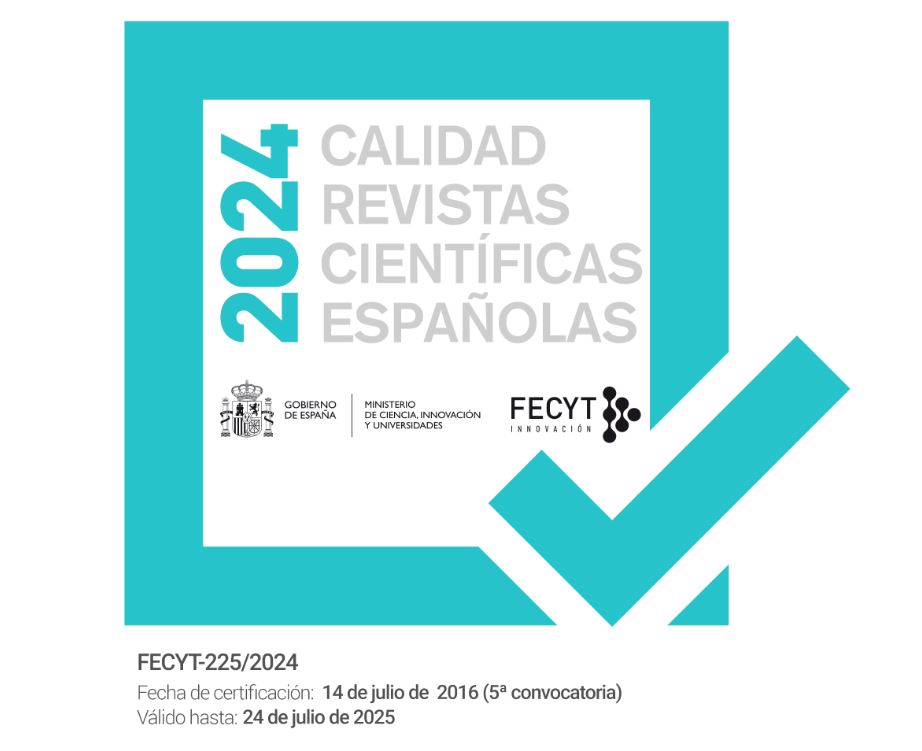Women in the development of sociability networks and library management in the 18th century: the cultural and intellectual environment of the Duchesses of Almodóvar
DOI:
https://doi.org/10.30827/arenal.v29i2.23945Keywords:
Duchess of Almodóvar. Cultural mediation. Transnational. Embassies. Libraries. EnlightenmentAbstract
This paper analyses women's participation in sociability networks and the formation of libraries in the eighteenth century. These were connections and spaces that were formed, or that they themselves built, at the crossroads of the circulation of ideas, fashions and objects with a strong transnational component. On the one hand, I will analyse the participation of the first Duchess of Almodovar, María Joaquina Monserrat, in different intellectual and social circles as a result of her work as ambassadress consort in different European countries. On the other hand, I will delve into the figure of her niece Josefa Dominga Catalá, future Duchess of Almodóvar, and the importance of training and environment for the development of the management skills of family libraries.
Downloads
References
ALLEN, Gemma: “The Rise of the Ambassadress: English Ambassadorial Wives and Early Modern Diplomatic Culture”. The Historical Journal, 62-3 (2019), 617-638.
ÁLVAREZ DE MIRANDA, Pedro: “El duque de Almodóvar, autor de la ‘Carta del castellano de Avilés’ (1757)”. Bulletin of Spanish Studies, 91-9 (2014) 29-49.
ANASTÁCIO, Vanda: “Women and literary sociability in Eighteenth-Century Lisbon”. En GILLEIR, Anke; MONTOYA, Alicia y VAN DIJK, Susan (eds.): Women Writing Back/Writing Women Back. Leiden-Boston, Brill, 2010, pp. 93-111.
ANASTÁCIO, Vanda: “Women Writers in an International Context: Was the Marchioness of Alorna (1750-1839) Cosmo- politan?”. En BETHENCOURT, Francisco (ed.): Cosmopolitanism in the Portuguese-Speaking World. Leiden-Boston, Brill, 2018, pp. 132-143.
ARIAS DE SAAVEDRA, Inmaculada: “Libros, lectores y bibliotecas privadas en la España del siglo xviii”. Chronica Nova. Revista de Historia Moderna de la Universidad de Granada, 35 (2009) 15-61.
ARIAS DE SAAVEDRA, Inmaculada: “Lectura y bibliotecas de mujeres en la España del siglo xviii. Una aproximación”. Cuadernos de Ilustración y Romanticismo, 23 (2017) 57-82.
ASTORGANO ABAJO, Antonio: “El inquisidor Rodríguez Laso y el ocaso de la Inquisición valen- ciana (1814-1820)”. Cuadernos de Ilustración y Romanticismo, 13 (2005) 297-345.
BALLESTER BUIGUES, Irene (ed.): Dos-cents anys a l’ombra de la duquessa d’Almodóvar. Va- lencia, Edicions 96, 2015.
BALLESTER BUIGUES, Irene: La duquessa d’Almodóvar: vida d’una aristócrata valenciana a la fi del segle xviii. Xaló, Institut d’Estudis Comarcals de la Marina Alta, 2007.
BAS MARTÍN, Nicolás: Spanish Books in the Europe of the Enlightenment (Paris and London). Leiden-Boston, Brill, 2018.
BELLO VÁZQUEZ, Raquel: “Elite Female Authors in the Field of Power in Eighteenth-Century Portugal: Epistolary Writing as Part of a Political Strategy”. Journal for Eighteenth-Century Studies, 39-2 (2016) 251-266.
BELLO VÁZQUEZ, Raquel: Mulher, nobre ilustrada, dramaturga. Osmia de Teresa de Mello Breyner no sistema litérario portugues (1788-1795). Santiago, Edicións Laiovento, 2005.
BLUTRACH, Carolina: “Traveling Together as a Couple: Gender, Diplomacy and Cultural Media- tion. The Countess of Fernán Núñez, Spanish Ambassadress in Lisbon and Paris (1787-1791)”. Studies in Eighteenth-Century Culture, vol. 52 (2023, en prensa).
BOLUFER PERUGA, Mónica: “Los espejos del género entre Ilustración y Romanticismo. Retratos femeninos en la mirada y el pincel de Vicente López Portaña (1772-1850)”. Dieciocho, 45-1 (2022), pp. 135-160.
BOLUFER PERUGA, Mónica: “Poseer (¿y leer?) libros de civilidad en el siglo xviii: un análisis a través de las bibliotecas pri- vadas”. Chronica Nova, 46 (2020) 145-175.
BOLUFER PERUGA, Mónica: “Josefa Amar y Borbón (1749-1833). An intellectual woman”. En LEHNER, Ulrich L. (ed.): Women, Enlightenment and Catholicism. London-New York, Routledge, 2018, pp. 50-62.
BOLUFER PERUGA, Mónica: “Ver desde su retiro la extensión del mundo”. La experiencia y el relato de viajes”. En GARCÍA HURTADO, Manuel-Reyes (ed.): El siglo xviii en femenino. Las mujeres en el Siglo de las Luces. Madrid, Síntesis, 2016, pp. 219-250.
BOLUFER PERUGA, Mónica: “Between two shores: travellers as cultural mediators. The journey to Spain in the Eighteenth Century”. Acta Histriae, 17 (1-2) (2009) 83-102.
BOLUFER PERUGA, Mónica: “Desde la periferia. Mujeres de la Ilustración en Province”. En DE LA CALLE, Román (coord.): La Real Academia de Bellas Artes de San Carlos en la Valencia Ilustrada. Valencia, PUV, 2009, pp. 67-100.
BUENO BLANCO, Álvaro: “Las mujeres como criterio para la designación de diplomáticos: el caso de la marquesa de Mirabel en París (1620-1632)”. Hipogrifo, 9-1 (2021) 901-916
CAMPBELL, Julie D. y LARSEN, Anne R. (eds.): Early Modern Women and Transnational Com- munities of Letters. Burlington-Farnham, Ashgate, 2009.
D’EZIO, Mariana: “Literary and Cultural Intersections between British and Italian Women Writers and Salonnières during the Eighteenth Century”. En BROWN, Hilary y DOW, Gillian (eds.): Readers, Writers, Salonnières. Female Networks in Europe, 1700-1900. Bern, Peter Lang, 2011, pp. 11-29.
DE DEMERSON, Paula: “Catálogo de las socias de honor y mérito de la Junta de Damas Matritense (1787-1811)”. Separata de Anales del Instituto de Estudios Madrileños s, n.º 7 (1971), 269-274. DOW, Gillian (ed.): Translators, Interpreters, Mediators: Women Writers, 1700-1900. Oxford, Peter Lang, 2007.
EGER, Elizabeth: “‘The noblest commerce of mankind’: Conversation and Community in the Bluestocking Circle”. En KNOTT, Sarah y TAYLOR, Barbara (eds.): Women, Gender and Enlightenment. Basingstoke, Palgrave Macmillan, 2007, pp. 288-305.
FRIJHOFF, Willem: “Cosmopolitismo”. En FERRONE, Vincenzo y ROCHE, Daniel (eds.): L’Illuminismo. Dizionario storico. Roma, Editori Laterza, 1997, pp. 21-30.
GARCÍA SÁNCHEZ, Jorge: “José Nicolás de Azara, un icono del Grand Tour”. Espacio, Tiempo y Forma, Serie IV, Historia Moderna, 21 (2008) 147-166.
GUINOT FERRI, Laura: “The Keys to the Forbidden Books: the Duchess of Almodóvar and her Libraries”, in WATSON, Elise; FARRELL-JOBST, Jessica y EPSTEIN, Nora (eds.): Gender and the Book Trades. Leiden, Brill, 2023 (en prensa).
HERRERA, Bernardino: Memorias históricas de los desposorios, viages, entregas y respectivas funciones de las reales bodas de las serenísimas infantas de España y de Portugal la señora doña Carlota Joachina, y la señora doña Mariana Victoria, en el año de 1785. Madrid, por Don Antonio de Sancha, 1787.
JAFFE, Catherine M.: “María Lorenza de los Ríos y Loyo, Marquesa de Fuerte-Híjar. Women’s Writing and Charity in the Spanish Enlightenment”. En LEHNER, Ulrich L. (ed.): Women, Enlightenment and Catholicism. London-New York, Routledge, 2018, pp. 73-86.
JAFFE, Catherine M., y MARTÍN-VALDEPEÑAS YAGÜE, Elisa (eds.): Society Women and En- lightened Charity in Spain. The Junta de Damas de Honor y Mérito, 1787-1823. Baton Rouge, Louisiana State University Press, 2022.
KÜHNEL, Florian: “‘Minister-like cleverness, understanding, and influence on affairs’. Ambassa- dresses in everyday business and courtly ceremonies at the turn of the eighteenth century”. En SOWERBY, Tracey A. y HENNINGS, Jan (eds.): Practices of Diplomacy in the Early Modern World c. 1410-1800. London-New York, Routledge, 2017, pp. 130-146.
LARRIBA, Elisabel: El público de la prensa en España a finales del siglo xviii (1781-1808). Zaragoza, Prensas de la Universidad de Zaragoza, 2014.
LARSEN, Anne R.: “Journeying Across Borders: Catherine des Roches’s Catalog of Modern Women Intellectuals”. En CAMPBELL, Julie D. y LARSEN, Anne R. (eds.): Early Modern Women and Transnational Communities of Letters. Burlington-Farnham, Ashgate, 2009, pp. 229-250.
LEON TELLO, Pilar: Damas nobles de la Reina María Luisa: índice de expedientes de la Orden conservados en el Archivo Histórico Nacional. Madrid, Dirección General de Archivos y Bi- bliotecas, 1965.
LÓPEZ-CORDÓN CORTEZO, M.ª Victoria: “Mariana Victoria de Portugal: una infanta y muchas cartas”. Pedralbes, 36 (2016) 17-53.
LÓPEZ-CORDÓN CORTEZO, M.ª Victoria: “Entre damas anda el juego: las camareras mayores de Palacio en la edad moderna”. Cuadernos de Historia Moderna, Anejo II (2003) 123-152.
LOUSADA, Maria Alexandre: “Sociabilidades mundanas em Lisboa. Partidas e Assembleias, c. 1760-1834”. Penélope. Fazer e desfazer História, 19-20 (1998) 129-160.
LOUSADA, Maria Alexandre: Espaços de sociabilidade em Lisboa: finais do século xviii a 1834. Tesis doctoral, Universidad de Lisboa, 1995.
MONSERRAT Y ACUÑA, María Joaquina (Duquesa de Almodóvar): Elogio de la Serenísima Señora Doña Mariana Victoria, infanta de Portugal, esposa del serenísimo señor infante Don Gabriel. Madrid, por Don Antonio de Sancha, 1789.
MORI, Jennifer: The Culture of Diplomacy: Britain in Europe, C. 1750-1830. Manchester, Man- chester University Press, 2011.
O’PHELAN GODOY, Scarlett y SALAZAR-SOLER, Carmen (eds.): Passeurs, mediadores cultura- les y agentes de la primera globalización en el Mundo Ibérico, siglos xvi-xix. Lima, Pontificia Universidad Católica del Perú, Instituto Riva-Agüero, 2005.
OLIVÁN SANTALIESTRA, Laura: “Lady Anne Fanshawe, ambassadress of England at the Court of Madrid (1664-1666)”. En SLUGA, Glenda y JAMES, Carolyn (eds.): Women, Diplomacy and International Politics since 1500. London-New York, Routledge, 2016, pp. 68-85.
OLIVÁN SANTALIESTRA, Laura: “Gender, Work and Diplomacy in Baroque Spain: The Ambassadorial Couples of the Holy Roman Empire as Arbeitspaare”. Gender and History, 29-2 (2017) 423-445.
PEARSON, Jacqueline: Women’s Reading in Britain: 1750-1835. A dangerous recreation. Cambridge, Cambridge University Press, 1999.
RIVAS ALBADALEJO, Ángel: “Leonor María de Guzmán (1590-1654), VI condesa de Monterrey, de “Embaxatriz” en Roma a “virreina” de Nápoles”. En CARRIÓ-INVERNIZZI, Diana (dir.): Embajadores culturales. Transferencias y lealtades de la diplomacia española de la Edad Moderna. Madrid, UNED, 2016, pp. 289-319.
RODRÍGUEZ LASO, Nicolás: Elogio histórico del excelentísimo señor duque de Almodóvar. Madrid, Imprenta de Sancha, 1795.
RODRÍGUEZ LASO, Nicolás: «Diario en el Viage de Francia e Italia (1788)». Edición crítica, estudio preliminar y notas de Antonio Astorgano, Zaragoza, Institución Fernando el Católico, 2006.
RUIZ TORRES, Pedro: “La nobleza en el País Valenciano durante la transición al capitalismo”. Manuscrits. Revista d’Historia Moderna, 4-5 (1987), pp. 91-107.
RUBIAL GARCÍA, Antonio: “Las virreinas novohispanas. Presencias y ausencias”. Estudios de Historia Novohispana, 50 (2014) pp. 3-44.
RUSSELL, Gillian: Women, Sociability and Theatre in Georgian London. Cambridge, Cambridge University Press, 2007.
SEGURA, Pascual: Thomas Villanova. El científico de Bigastro que descifraba las estrellas, Alicante, Fun Readers, 2018.
SERRANO, Elena: Ladies of Honor and Merit. Gender, Useful Knowledge, and Politics in Enlightened Spain. Pittsburgh, University of Pittsburg Press, 2022.
SNOOK, Edith: “Elizabeth Isham’s ‘own books’: Property, Propriety, and the Self as Library”. En KNIGHT, Leah; WHITE, Micheline y SAUER, Elizabeth (eds.): Women’s Bookscapes in Early Modern Britain. Michigan, University of Michigan Press, 2018, pp. 77-93.
WATANABE-O’KELLY, Helen y MORTON, Adam (eds.): Queens Consort, Cultural Transfer and European Politics, c. 1500-1800. London-New York, Routledge, 2017.
YUN CASALILLA, Bartolomé: “Aristocratic Women across Borders, Cultural Transfers, and So- mething More. Why Should We Care?”. En PALOS, Joan-Lluís y SÁNCHEZ, Magdalena S. (eds.): Early Modern Dynastic Marriages and Cultural Transfer. London-New York, Routledge, 2016, pp. 237-257.
Downloads
Published
How to Cite
Issue
Section
License
Los/as autores/as que publican en esta revista están de acuerdo con los siguientes términos:
Los autores/as conservarán sus derechos de autor y garantizarán a la revista el derecho de primera publicación de su obra, el cuál estará simultáneamente sujeto a la Licencia de reconocimiento de Creative Commons 4.0 BY-NC-ND que permite a terceros compartir la obra siempre que se indique su autor y su primera publicación esta revista.
Los autores/as podrán adoptar otros acuerdos de licencia no exclusiva de distribución de la versión de la obra publicada (p. ej.: depositarla en un archivo telemático institucional o publicarla en un volumen monográfico) siempre que se indique la publicación inicial en esta revista.
Se permite y recomienda a los autores/as difundir su obra a través de Internet (p. ej.: en archivos telemáticos institucionales o en su página web) antes y durante el proceso de envío, lo cual puede producir intercambios interesantes y aumentar las citas de la obra publicada. (Véase El efecto del acceso abierto).














